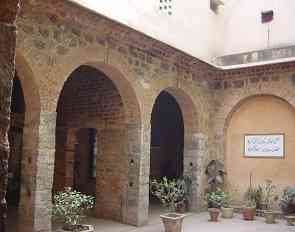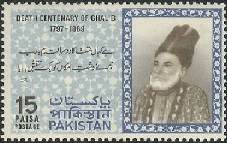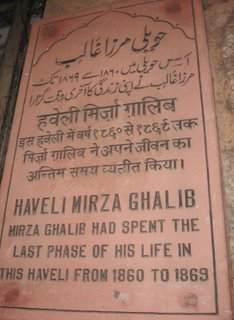Adnan Ahmad
hoi muddat ke Ghalib mar gaya par yaad aataa hai
woh har ek baat pe kehna ke yooN hota to kia hota

One such person is Mirza Asadullah Khan Ghalib. Given his towering and well-known stature, instead of writing purely a biographic piece I will be short and mention a few of his verses and a few of the highlights of this wizard’s life.
Ghalib’s portrait to the right is from urdustan.com
Through earlier years of my life the name Mirza Ghalib invoked a stereotypical image in my mind about yet another old poet from the subcontinent writing on the classical subjects of romance and appearing thoroughly outdated in my world.
That was until I came across Gulzar‘s serial Mirza Ghalib and found outsides of Ghalib and meanings of his verses that I had not known before.
Here is a sample:
![]()
 The year was 1990 and someone in our family had gained access to the tapes that were not available in the market yet. Over the course of next few years of my high school I watched the serial over and over again, read his poetry and about his life, with each attempt increasing my fascination with the poet and his poetry. Photo to the left is the ‘haveli’ where Ghalib lived.
The year was 1990 and someone in our family had gained access to the tapes that were not available in the market yet. Over the course of next few years of my high school I watched the serial over and over again, read his poetry and about his life, with each attempt increasing my fascination with the poet and his poetry. Photo to the left is the ‘haveli’ where Ghalib lived.
And there are still days when I find new meanings in his verses I had heard and known for ages. 
Image to the right is a postal stamp issued by Government of Pakistan in commemoration of Mirza Ghalib
This is the collection of poems about which a famous Urdu critic from the 19th century, Abdul Rehman Bijnori, once said that there are two books sent from the heaven to the sub-continent, one is Holy Geeta (muqqaddas Vaids) and the other is deewan-e-Ghalib. Still it baffles me to think how a 25-year old can express such mature sorrow in a verse like:
ghar meiN tha kia ke tera gham osay ghaarat karta
woh jo rakhtay the hum ik hasrat-e-taameer so hai
And another verse which goes like this:
hoa jab gham se yooN be-hiss to gham kia sar ke kaTnay ka
na hotaa gar juda tan se to zaanoo par dharaa hota

Photo to the right is a plaque at mazar-i-Ghalib
I think whatever he claimed for himself was an understatement. Many including myself, do consider him a philosopher, a great scholar and even a wali (saint) of his time. And on that tangent, I don’t think I’ve heard a better elaboration of tawheed (oneness of God) than his verse:
hum muwwahid haiN hamara kashe hai tark-e-rusoom
millateN jab miT gayeeN, ajzaa-i-imaaN ho gayeeN
In anoher instance he accepts God in a way few of us can:
jaaN dee, dee hoi osee kee thee
haq to ye hai ke haq adaa na hoa
Finally, a verse that stays with me all the time and unfolds itself in new ways each time I think about it.
hai kahaaN tammanna ka doosra qadam ya-rabb
hum ne dasht-e-imkaaN ko ek naqsh-e-paa paaya
Then, there is of course the letters Ghalib wrote. Here is a wonderful sample read by Zia Mohiuddin.
Recommended Website on Ghalib:
(1) There is a very good biography of Ghalib present at a webpage here.
(2) Best of Ghalib




















































ATP editors:
Can you please get rid this italic script? It’s not easy to read. How did it get in?
A pleasant break, this post, from the ongoing politico-religious squabbles.
Ghalib’s poetry is multi-layered — like an onion bulb. You peel one layer, and you will find another, and yet another.
He shares with Iqbal and Faiz and other great poets his disregard for the orthodox, but expresses it wittily rather than in anger or contempt. For example:
[quote] KahaN mae-khaanay ka darwaza, Ghalib, aur kahaN Waaiz
Par itna jaantay haiN, kal who jata tha keh ham niklay [/quote]
[quote]The Shaikh hovers by the tavern door,
But believe me, Ghalib,
I am sure I saw him slip in,
As I departed [/quote]
You can see Ghalib chuckling in the above couplet.
In another banter on Paradise he wrote to a friend:
[quote] In Paradise it is true that I shall drink at dawn the pure wine mentioned in the Koran, but where in Paradise are the log walks with intoxicated friends in the night, or the drunken crowds shouting merrily? Where shall I find there the intoxication of the monsoon clouds? Where is there is no autumn how can Spring exist? If the beautiful houris are always there, where will be the sadness of separation and the joy of union? Where shall we find there a girl who flees away when we would kiss her? [/quote]
One can see in this paragraph both masti and mysticism at its ultimate.
Kamala: You might find Ralph Russel’s books on Ghalib useful. The above quotes are from his book.
Nuskha-hi-Vafa by Faiz, Qulyat-e-Iqbal, and Dewan-e-Ghalab are three must for any Urdu lover. Mirza Ghalab’s great grand father was an Uzbek who like millions of other Persian and Turkic people migrated to Sub-Continental India during the Muslim period. His contributions to Urdu and Persian literature are immense. His mastery of Turkish and Persian literature and language shows up in his Urdu poetry as well. He is part our heritage and we love him. Thank you for this post. Please try to include some of his English translations here for those who are unable to read and understand his original work.
hum kahan kay daanaa thay, kis hunar main uqta thay
bay-sabab hua ghalib dushman aasmaan apna
kia kehnay Naveed!! Or Ghalib, I should say. You think of Ghalib when you have a sweet mango but in all honesty like Bilal mentioned I think of him even when I have overpriced low quality mexican mangoes from a local desi store. People would find it interesting to know that he wrote long qaseedas on mangoe for bahadar shah zafar. Imagine him playing with words!
Thanks for all the editing and formatting Owais and adding the clips.
Kamala, please check out KC Kanda’s verse and ghazal translations of major poets like Ghalib. I found this to be a good selection of English translations. I have also found another one which is translation of Ghalib’s letters
Adnan, thank you for posting this. And my all time favorite
ghar meiN tha kia ke tera gham osay ghaarat karta
woh jo rakhtay the hum ik hasrat-e-taameer so hai
Another one of my favorites is
mehrban ho kay bulla lo mujhay chahoo jis waqt
main gaya waqt naheen hoon kay aa bhee na sakoon
I think the comparison of Ghalib with Iqbal and/or Faiz is pointless as the latter poets considered Ghalib in high esteem & a classical ustad
People mention Jagjit-Chitra duo as being responsible for their interest in Ghalib and this makes sense. The cassette culture revived the interest in classical poets. What I have the greatest pleasure with, is listening to Ghalib by Begum Akhtar. Especially ibn-e-marium hua karay koee & zikr us pareevash ka
In an interview when someone asked how Begum Akhtar felt at the twilight of her career & she poignantly quoted Ghalib
hum kahan kay daanaa thay, kis hunar main uqta thay
bay-sabab hua ghalib dushman aasmaan apna
It is mango season in Pakistan and believe me whenever I have a really sweet one, I think of Ghalib :)
I would have loved to know him; he must have been a great friend as appears from his letter. Very happy, Adnan, that you added a audio clip by Zia Mohuddin